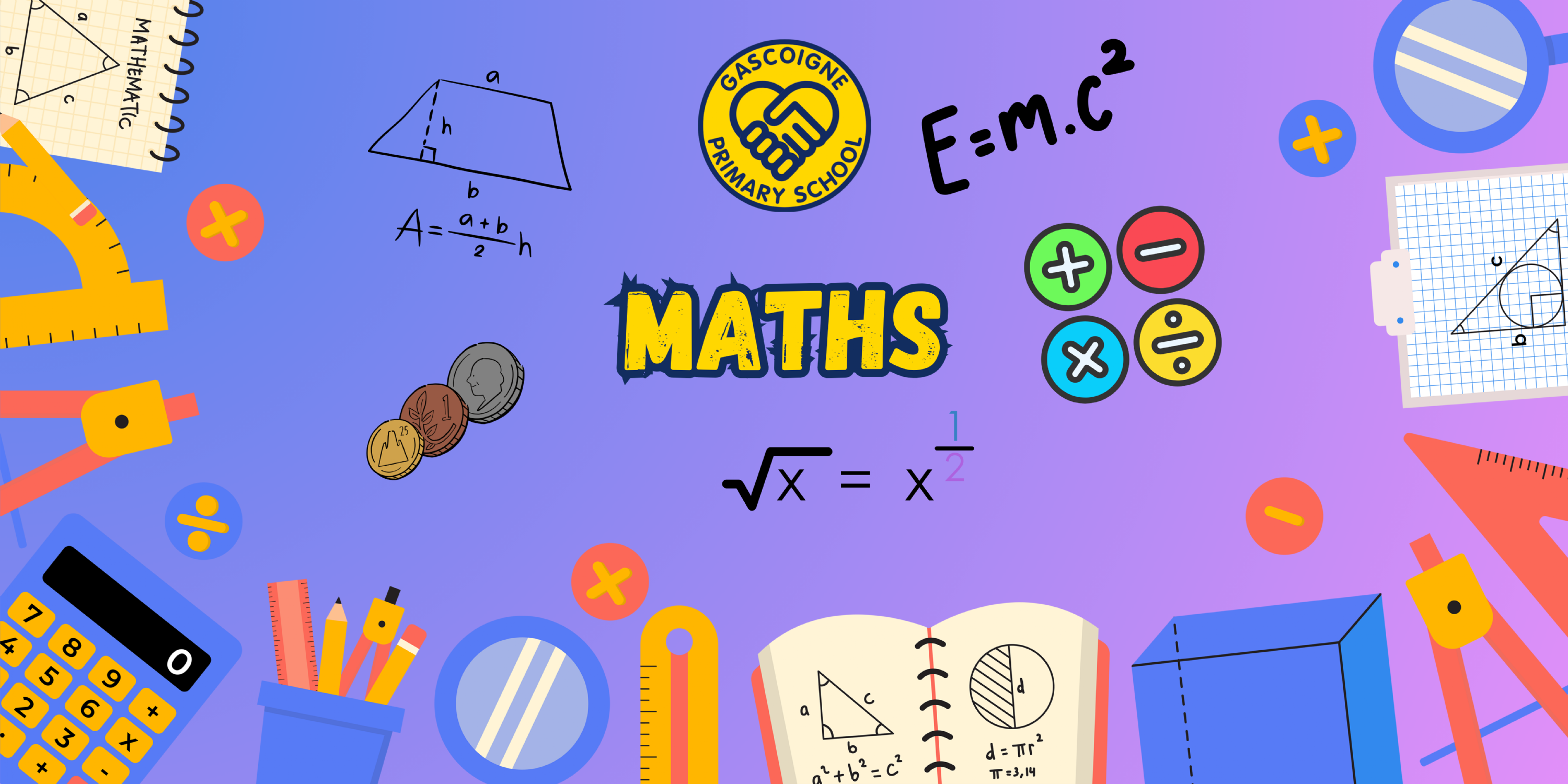Mathematics

Mathematics at Gascoigne Primary School
At Gascoigne Primary School, we aim to deliver an engaging and inspiring curriculum that enables all pupils to acquire the basic skills as well as develop their appreciation of the different mathematical forms and structures through a wider creative curriculum, which links learning to real life situations.
We aim to increase pupil confidence in maths, so they are able to be numerate, inquisitive and expressive when using the language of maths with assurance.
Gascoigne Vision Statement
At Gascoigne Primary School, every child can achieve and is a capable mathematician with the ability to reason and problem solve. It is our responsibility as teachers to provide the environment and experience to make this possible.
High quality dialogue within the classroom will make sure our children are challenging their own thoughts with those around them whilst broadening their knowledge and understanding. Teachers use correct mathematical vocabulary and encourage children to do the same, rather than simplifying terms to make it “easier”. This accelerates their language skills as well as deepens their understanding of mathematical concepts.
Mathematics is essential to everyday life, critical to science, technology and engineering, and necessary for financial literacy and most forms of employment. A high-quality mathematics education therefore provides a foundation for understanding the world, the ability to reason mathematically, an appreciation of the beauty and power of mathematics, and a sense of enjoyment and curiosity about the subject. (NC 2014)
Our Maths Mastery Curriculum
Since September 2021, Gascoigne has adopted a new maths mastery curriculum called Maths No Problem, which is an approach to teaching maths developed in Singapore. This is one of two schemes approved by the Department for Education to deliver a mastery approach, whilst covering the full National Curriculum across years 1 to 6.
Maths No Problem textbooks and resources are used to support our teaching. Our lesson structure enables all children to explore a mathematical problem at the beginning of each lesson. This is then unpicked in greater depth before children are asked to apply this concept in a variety of ways.
Maths No Problem is based on the concept of a spiral curriculum, so that children are always revisiting concepts previously learnt. We want our children to make links between ideas and find patterns in what they are learning. It is important that our children develop a deep, long-term understanding of a concept before moving onto the next year group.
Our lessons encourage independence, talk, collaborative thinking and meta cognition. All of which are vital skills to prepare our children to be ready for secondary school and beyond.
Lessons at Gascoigne reflect the teaching for mastery pedagogy through the following distinct parts:
- Explore: Open task to start the lesson where children explore a variety of methods to solve one problem
- Master: the selection of methods are brought together and taught with a focus on the key strategy or learning point for the lesson
- Guided Practice: questions for children to practice the strategy / key learning for the lesson with support from their peers and teacher
- Independent Practice: questions for children to answer independently in their maths journals or workbooks
In this approach, problem-solving is at the heart of mathematics teaching. The focus is not on rote procedures, rote memorisation or tedious calculations, but on relational understanding. Children are encouraged to solve problems which will help to build mathematical fluency.
We train all new members of staff using the scheme and provide ongoing training and support for existing teachers through CPD, team teaching and lesson visits.
Our maths mastery approach consists of the following elements:
1. Representation
At Gascoigne Primary School we use the Concrete Pictorial Abstract (CPA) approach. Much of this approach is to ensure children gain mastery in maths at each year level. Pupils will spend time exploring a topic, reinforcing it with practice, before moving onto the next topic. All ideas are built on previous knowledge and pupils have ample opportunity to develop relationships between topics.
2. Inclusivity
Our curriculum enables pupils’ difficulties and misconceptions are identified through immediate formative assessment and addressed with immediate intervention.
Our teachers provide an inclusive teaching environment for all pupils. Lessons provide all children with opportunities for reasoning, explanation and clarification to deepen their knowledge.
As a school, we create opportunities for bespoke in and out of class small group structured sessions driven with a focus on mathematical language and the CPA approach for learners who struggle to conceptualise taught concepts in class.
3. Mathematical Thinking
The National Curriculum for mathematics reflects the importance of spoken language in pupils’ development across the whole curriculum-cognitively, socially and linguistically. The quality and variety of language that pupils hear and speak are key factors in developing their mathematical vocabulary and presenting mathematical justification, argument or proof. Pupils must be assisted in making their thinking clear to themselves as well as others. Our approach ensures that teachers support pupils to build secure foundations by using discussion to probe and remedy their misconceptions.
4. Fluency
Fluency in mathematics is the ability to complete mathematical problems accurately and efficiently, and having the confidence and ability to flexibly manipulate mathematical concepts. Some children will acquire this skill with quick recall of a number of facts and a strong procedural understanding, whereas others will achieve the same results with a deep conceptual understanding.
Our curriculum recognises the importance of this and pupils are exposed to both and see problems solved using multiple methods.
5. Variation and Coherence
Variation can be seen throughout our lessons with the amount of assistance given to pupils, where scaffolded tasks can be followed by less-scaffolded tasks. Our lessons are centred around an explore task, allowing pupils to consider it more thoroughly, without rushing. This slower pace leads to greater progress, ensuring pupils are secure in their understanding and not build on misconceptions.
Arithmetic
As a school, we are keen to develop children’s mental arithmetic skills. Mental maths skills are incorporated into daily lessons; this helps a pupil’s ability to calculate mentally, develop knowledge of numbers and multiplication facts. We have introduced a focus on retrieval of facts previously learnt as well as fast and automatic recall of number facts.
Mastering Number
In key stage 1, the Mastering Number programme has been introduced as a systematic and structured approach to teaching early addition and subtraction skills. The programme includes stages such as adding 1, adding 0, making and breaking numbers to 10, addition and subtraction of numbers below 20 and then applying this to larger 2-digit numbers. Sessions follow a structure of some explicit teaching using animation and also carefully designed practice questions for the children.
Fluent in Five & Flashback Four
In key stage 2, daily arithmetic practice or ‘fluent in 5’ is built into Maths lessons, the content of which has been carefully mapped to reflect the learning from the previous year that should then become automatic. We will also be using a style called “Flashback four” where the lesson starts with four retrieval questions (from last lesson, last week, last half-term and last year). The intention is that this will increase retrieval and will minimise gaps in learning and the need to re-teach content.
Times Table Rockstars / Numbots
By the end of year 4, children should be proficient in all of their times-tables up to 12x12. In the summer term, the children in year 4 sit the Multiplication Tables Check (MTC) to test their knowledge of the timetables. To support the learning and continued practise of times-tables, we use Times Table Rockstars (TTRS). This is an online platform where children engage in a range of games to improve their speed and accuracy with times-tables.
Prior to learning their times-tables, children need to become proficient in their basic addition and subtraction skills. To support this, we use Numbots. This is linked to TTRS. Children in key stage 1 become faster and more efficient at their basic number bonds. All children are encouraged to practise the relevant game daily at home and weekly at school.
Parent Workshops
| Workshop Presentation Downloads | Date of Workshops |
|---|---|
| MTC Parent Info Session | 18/01/2024 |
| Y2 Maths Workshop | 25/01/2024 |
| Y3 & Y4 Maths Workshop | 01/02/2024 |
| Y5 & Y6 Maths Workshop | 08/02/2024 |
| Fluency in Number Facts - KS1 Parent Workshop | 07/03/2024 |
| Y3 & Y4 Number Facts Workshop | 14/03/2024 |
Multiplication Tables Check
MTC Parent Info Session - Jan 2025
2025 Information for Parents - Multiplication Table Checks
Under the current National Curriculum:
"Pupils should be taught to recall multiplication and division facts for multiplication tables up to 12 × 12"
-The Year 4 programme of study for mathematics
Primary children are required to learn their times tables up to 12 x 12 by the end of Year 4. The Multiplication Tables Check assesses the instant recall of multiplication facts.
|
|
|
|
|
|



